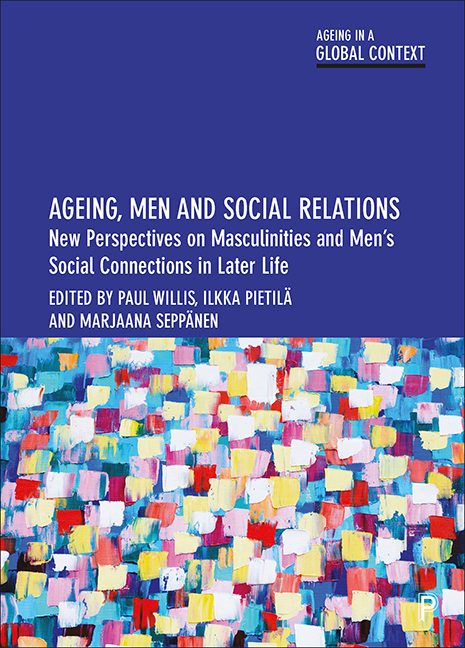 Ageing, Men and Social Relations
Ageing, Men and Social Relations Published online by Cambridge University Press: 18 January 2024
Introduction
Hong Kong has experienced enormous transformation in the past few decades: from a British colony to a special administrative region of China, from an industrial society to an international financial centre, from extreme poverty and working-class dominance to affluence and an expanded middle class, and from deprivation to adequate social service provision. What is the dominant form of masculinity, and how has it changed over time in parallel with such socioeconomic and political transformation? How do Hong Kong gay men negotiate with that dominant form and gay masculinity? What does it mean to be a Chinese man or a Chinese gay man? Was it more difficult to be gay in the past than it is today? This chapter attempts to answer some of these questions by examining two distinct generations of Hong Kong gay men. In so doing, it bridges the gap between masculinity studies and generational sexuality studies. There is a large body of literature on masculinity but little is known about generational masculinities, and few studies in this area focus on heterosexual men (for example, Inhorn and Wentzell, 2011; Català et al, 2012; Hearn et al, 2012). Similarly, there is a burgeoning literature on generational studies (for example, Strauss and Howe, 1991; Inglehart, 1997; Glass, 2006) and generational sexuality studies are emerging (Plummer, 2010), but few studies in these areas focus on generational masculinities. This chapter seeks a dialogue between these two bodies of literature. It examines the cross-generational continuity and change in masculinity in a non-Western locale to uncover the interplay between the personal and the social, the local and the global to inform a broader international understanding of masculinity. More specifically, it examines continuity and change for men with a marginalised (sexual) identity negotiating the male role in Hong Kong over time by comparing and contrasting two generations of gay men using a life course approach: those born before the 1950s and those born after 1990. Both generations have had to accomplish the ideals of Chinese masculinity – breadwinner masculinity centred around the family in the past and neoliberal entrepreneurial masculinity centred around education, work and family at present – of which responsibility and respectability are two key dimensions.
To save this book to your Kindle, first ensure [email protected] is added to your Approved Personal Document E-mail List under your Personal Document Settings on the Manage Your Content and Devices page of your Amazon account. Then enter the ‘name’ part of your Kindle email address below. Find out more about saving to your Kindle.
Note you can select to save to either the @free.kindle.com or @kindle.com variations. ‘@free.kindle.com’ emails are free but can only be saved to your device when it is connected to wi-fi. ‘@kindle.com’ emails can be delivered even when you are not connected to wi-fi, but note that service fees apply.
Find out more about the Kindle Personal Document Service.
To save content items to your account, please confirm that you agree to abide by our usage policies. If this is the first time you use this feature, you will be asked to authorise Cambridge Core to connect with your account. Find out more about saving content to Dropbox.
To save content items to your account, please confirm that you agree to abide by our usage policies. If this is the first time you use this feature, you will be asked to authorise Cambridge Core to connect with your account. Find out more about saving content to Google Drive.